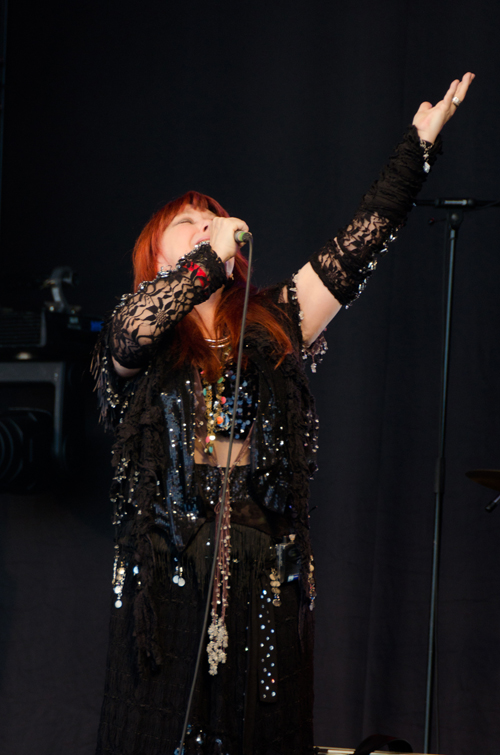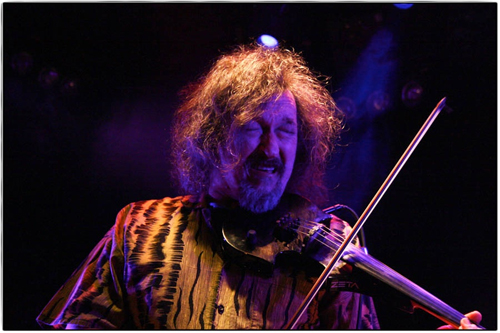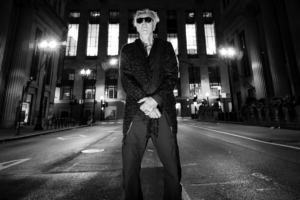CURVED AIR – Vivaldi is back


1. The band has been popular for the famous violin sound. What led you to the idea of adding violin to your sound when the band was formed?
Darryl Way, a violin student at the R oyal College of Music joined forces with electric guitarist Francis Monkman who was studying Organ and Harpsichord at the Royal Academy of Music . They met while trying effects pedals in a music shop in London and discovered similar aspirations. They formed the nucleus of the band that became Curved Air – in 1969 the year before I joined…
2. Three out of your eight albums entered the UK Top 20. How important was to be in the Top 20 back in the 70s? I mean what were the reaction in terms business, sales and touring?
Through the early months of 1970 we toured intensively, mostly small venues and colleges, earning rapturous receptions from audiences and the press . Before the end of the year we had a major label , ‘Warners’ release our first album .. This album climbed into the top 10 in December 1970 and we began a tour with Black Sabbath playing large halls with them and subsequently headlined tours ourselves . We played two long US tours also during 71/72 , including New York ‘Filmore East to the ‘Warehouse’ New Orleans and ‘Whisky A Go Go’ in LA. We coninued to have healthy record sales and media respect due to the quality of our shows and albums.
3. What happened to Monkman and the rest of the band during the recordings of the Phantasmagoria? There were rumors about mental issues surrounding the band.
Darryl’s material was on one side of the album and Francis’s on the other as it had been on the 2nd Album . They mixed their own sides of the album with the producer engineer, because by then they each heard things differently, and this was the most effective solution. All the band had been sharing a flat together for three years and touring intensively and there was never much time to create new material so they wrote and arranged independently and felt they got the best results this way. The band were exhausted from touring, and Darryl, Francis and Florian decided they needed a break and left the band , amicably handing over to the new players.
4. What made the group disband in the 70s?
By the end of 1976 even though the live shows were still very successful and the press was solidly behind the band, I had for some time been restless and disatisfied with the the disparity of the band’s writing and I think we were not overly surprised when Miles Copeland, our manager . abandoned expensive progressive musicians in favour of the cheap and exciting new Punk bands I was liberated and open to new influences …
5. How important was the formation of The Police by Stewart Copeland. I mean how Stewart’s career influence the popularity of the Curved Air?
Important for me, because Stewart and I were together from ‘The Police’s’ beginning throughout their astonishing career , I witnessed ‘The Police’ rise – becoming the most important ’80s R ock Stars . I don’t think they had any effect on the perception of Curved Air at the time since the New Wave manifesto if anything negated all that went before .
6. Are you still in contact with Stewart?
Yes , we have three children together and a grandaughter .
7. You have a new album coming out which is called “Airwaves – live at the BBC”. Could you talk us about this album?
These recordings have been excellently remastered from the vintage sessions and they now really capture the energy of Curved Air at the very beginning when Darryl and Francis, Florian and R ob Martin and I were playing our very first shows . We were lucky that John Peel, the influencal MC and broadcaster, saw the band play at the R oundhouse in London and offered us live radio broadcasts the following week . These sessions brought our music to the ears of a host of music fans because everyone hungry for new music listened to John Peel’s recommended bands and artists. This was a pivotal moment for the band …
Also on ‘Airwaves’ is the Curved Air lineup with Stewart Copeland on drums , from the BBC ‘In Concert ‘series – a band alive and very relevant in the last months of 1976 before this phase of Curved Air dissolved . After these shows Stewart and I were seduced by the rage of Punk .Stewart and I both contribute to the sleeve notes of the beautifully packaged ‘Airwaves’ CD.

8. Which is the current lineup of the band and what are your next plans?
Original members are Florian Pilkington Miksa, the first Curved Air drummer, and myself . On violin is ex- Yehudi Menhuin schooled Paul Sax ,and on keyboards, extemporiser R obert Norton, who recorded and toured with me my ’90s albums ,’Songs from the Acid Folk’ and ‘Harmonics of Love’. They both bravely joined Curved Air at very short notice when Darryl Way left in October 2009 . .Bass player Chris has been with us since 2008 and is now our longest serving bass player. Kit Morgan is a veteran guitarist of many high profile tours and sessions – a superb player and performer . He joined us before two big shows in Japan in 2009 . We have toured Europe and the UK and Japan and recorded many of our shows and released a live album ‘Live Atmosphere’, released October 12th 2012 . It has already received glowing reviews. “Live Atmosphere’ and ‘Airwaves ‘ were both produced by composer/producer Marvin Ayres.
9. What kept the band alive for more than 40 years?
Creativity ,inspiration, innovation and great performances that bring back the kids who were the first followers in 1970 and sends them and their children and grandchildren home with their expectations surpassed …
10. We hear millions of stories about how popular bands were ripped of the labels in terms of royalties. Do you have any stories to share with us or any advice for the new music stars?
Yes, the ’70’s contracts were ‘in perpetuity’ which means that we gave away our rights to ever own our recordings . The contracts with the labels were often signed by management so we have scenarios where after a battle we managed to get paid our royalties or conversely have never received any accounts or royalties . There is a long list of situations for us to address , a time consuming and expensive process. R ecord companies and publishing companies merge with others and sell catalogues without the artists consent and it is compllicated to trace the responsible parties. It is important to understand and keep all the contracts you sign without getting unduly paranoid . It is hard to indentify the honorable and the devious and usually artists have no appetite for business . You win some , you lose some, you keep on being creative as long as possible.
11. How do you adjust the presence of the band in the digital era?
It is important to have your material available digitally for people to hear and buy impulsively . The sound quality will probably not be quite as good on the CDs . However CDs still sell very well especially at shows where people can see and respond to beautiful packaging. There is still something very special about being able to own music with the best quality sound on a physical digipack cd with booklet and information and creative design.
12. Do you support the distribution of single track at iTunes?
Do you mean a single ? I think some songs are satisfying and transporting on their own and on many albums there are only two or three great tracks . For me the aim is to make an album with every track powerful and beautiful and the collected songs creating an atmosphere musically and lyrically . Like a novel .
13. How important or not is to keep touring nowadays?
It seems to be very important but in these days of recession there is a big divide between attendances at the less frequent tours of very prestigeous stadium artists and current ephemeral pop acts, and other respected artists . Therefore for even very successful musicians fees are lower under these circumstances, and income from selling cds and other merchanise is important to boost income.
14. What is the next move for Curved Air?
It is time to create an important new album including original material from this excellent incarnation of Curved Air.
Source: http://www.curvedair.com/



